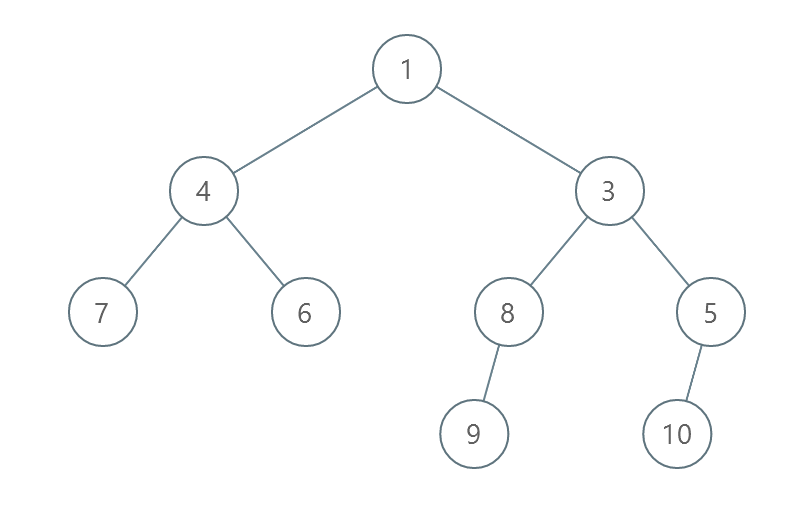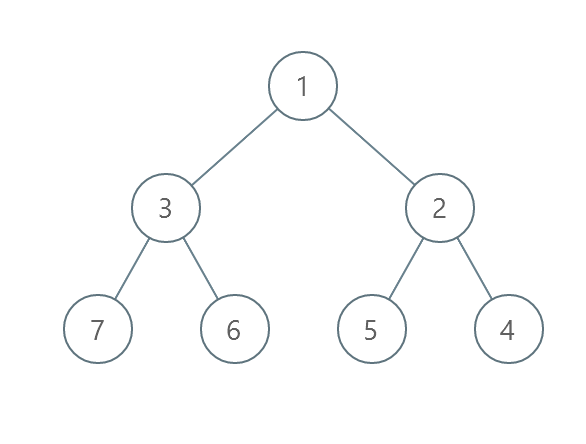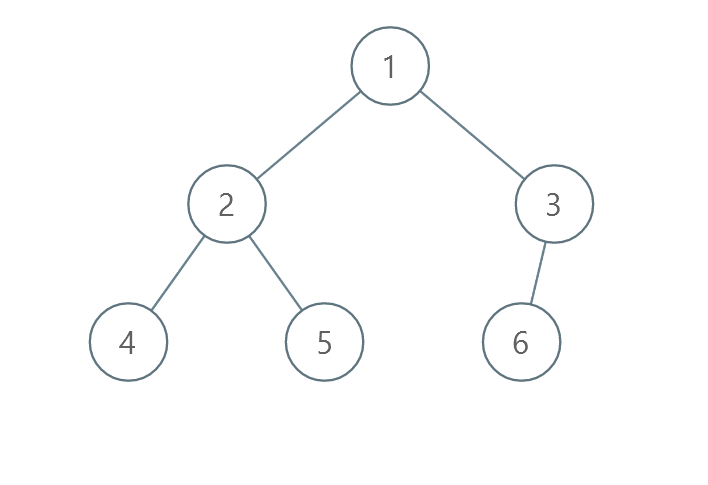Welcome to Subscribe On Youtube
Formatted question description: https://leetcode.ca/all/2471.html
2471. Minimum Number of Operations to Sort a Binary Tree by Level
- Difficulty: Medium.
- Related Topics: Tree, Breadth-First Search, Binary Tree.
- Similar Questions: Binary Tree Level Order Traversal, Longest Cycle in a Graph.
Problem
You are given the root of a binary tree with unique values.
In one operation, you can choose any two nodes at the same level and swap their values.
Return the minimum number of operations needed to make the values at each level sorted in a **strictly increasing order**.
The level of a node is the number of edges along the path between it and the root node.
Example 1:

Input: root = [1,4,3,7,6,8,5,null,null,null,null,9,null,10]
Output: 3
Explanation:
- Swap 4 and 3. The 2nd level becomes [3,4].
- Swap 7 and 5. The 3rd level becomes [5,6,8,7].
- Swap 8 and 7. The 3rd level becomes [5,6,7,8].
We used 3 operations so return 3.
It can be proven that 3 is the minimum number of operations needed.
Example 2:

Input: root = [1,3,2,7,6,5,4]
Output: 3
Explanation:
- Swap 3 and 2. The 2nd level becomes [2,3].
- Swap 7 and 4. The 3rd level becomes [4,6,5,7].
- Swap 6 and 5. The 3rd level becomes [4,5,6,7].
We used 3 operations so return 3.
It can be proven that 3 is the minimum number of operations needed.
Example 3:

Input: root = [1,2,3,4,5,6]
Output: 0
Explanation: Each level is already sorted in increasing order so return 0.
Constraints:
-
The number of nodes in the tree is in the range
[1, 105]. -
1 <= Node.val <= 105 -
All the values of the tree are unique.
Solution (Java, C++, Python)
-
/** * Definition for a binary tree node. * public class TreeNode { * int val; * TreeNode left; * TreeNode right; * TreeNode() {} * TreeNode(int val) { this.val = val; } * TreeNode(int val, TreeNode left, TreeNode right) { * this.val = val; * this.left = left; * this.right = right; * } * } */ class Solution { public int minimumOperations(TreeNode root) { Deque<TreeNode> q = new ArrayDeque<>(); q.offer(root); int ans = 0; while (!q.isEmpty()) { List<Integer> t = new ArrayList<>(); for (int n = q.size(); n > 0; --n) { TreeNode node = q.poll(); t.add(node.val); if (node.left != null) { q.offer(node.left); } if (node.right != null) { q.offer(node.right); } } ans += f(t); } return ans; } private int f(List<Integer> t) { int n = t.size(); List<Integer> alls = new ArrayList<>(t); alls.sort((a, b) -> a - b); Map<Integer, Integer> m = new HashMap<>(); for (int i = 0; i < n; ++i) { m.put(alls.get(i), i); } int[] arr = new int[n]; for (int i = 0; i < n; ++i) { arr[i] = m.get(t.get(i)); } int ans = 0; for (int i = 0; i < n; ++i) { while (arr[i] != i) { swap(arr, i, arr[i]); ++ans; } } return ans; } private void swap(int[] arr, int i, int j) { int t = arr[i]; arr[i] = arr[j]; arr[j] = t; } } -
/** * Definition for a binary tree node. * struct TreeNode { * int val; * TreeNode *left; * TreeNode *right; * TreeNode() : val(0), left(nullptr), right(nullptr) {} * TreeNode(int x) : val(x), left(nullptr), right(nullptr) {} * TreeNode(int x, TreeNode *left, TreeNode *right) : val(x), left(left), right(right) {} * }; */ class Solution { public: int minimumOperations(TreeNode* root) { queue<TreeNode*> q{ {root} }; int ans = 0; auto f = [](vector<int>& t) { int n = t.size(); vector<int> alls(t.begin(), t.end()); sort(alls.begin(), alls.end()); unordered_map<int, int> m; int ans = 0; for (int i = 0; i < n; ++i) m[alls[i]] = i; for (int i = 0; i < n; ++i) t[i] = m[t[i]]; for (int i = 0; i < n; ++i) { while (t[i] != i) { swap(t[i], t[t[i]]); ++ans; } } return ans; }; while (!q.empty()) { vector<int> t; for (int n = q.size(); n; --n) { auto node = q.front(); q.pop(); t.emplace_back(node->val); if (node->left) q.push(node->left); if (node->right) q.push(node->right); } ans += f(t); } return ans; } }; -
# Definition for a binary tree node. # class TreeNode: # def __init__(self, val=0, left=None, right=None): # self.val = val # self.left = left # self.right = right class Solution: def minimumOperations(self, root: Optional[TreeNode]) -> int: def swap(arr, i, j): arr[i], arr[j] = arr[j], arr[i] def f(t): n = len(t) m = {v: i for i, v in enumerate(sorted(t))} for i in range(n): t[i] = m[t[i]] ans = 0 for i in range(n): while t[i] != i: swap(t, i, t[i]) ans += 1 return ans q = deque([root]) ans = 0 while q: t = [] for _ in range(len(q)): node = q.popleft() t.append(node.val) if node.left: q.append(node.left) if node.right: q.append(node.right) ans += f(t) return ans -
/** * Definition for a binary tree node. * type TreeNode struct { * Val int * Left *TreeNode * Right *TreeNode * } */ func minimumOperations(root *TreeNode) (ans int) { f := func(t []int) int { var alls []int for _, v := range t { alls = append(alls, v) } sort.Ints(alls) m := make(map[int]int) for i, v := range alls { m[v] = i } for i := range t { t[i] = m[t[i]] } res := 0 for i := range t { for t[i] != i { t[i], t[t[i]] = t[t[i]], t[i] res++ } } return res } q := []*TreeNode{root} for len(q) > 0 { t := []int{} for n := len(q); n > 0; n-- { node := q[0] q = q[1:] t = append(t, node.Val) if node.Left != nil { q = append(q, node.Left) } if node.Right != nil { q = append(q, node.Right) } } ans += f(t) } return } -
/** * Definition for a binary tree node. * class TreeNode { * val: number * left: TreeNode | null * right: TreeNode | null * constructor(val?: number, left?: TreeNode | null, right?: TreeNode | null) { * this.val = (val===undefined ? 0 : val) * this.left = (left===undefined ? null : left) * this.right = (right===undefined ? null : right) * } * } */ function minimumOperations(root: TreeNode | null): number { const queue = [root]; let ans = 0; while (queue.length !== 0) { const n = queue.length; const row: number[] = []; for (let i = 0; i < n; i++) { const { val, left, right } = queue.shift(); row.push(val); left && queue.push(left); right && queue.push(right); } for (let i = 0; i < n - 1; i++) { let minIdx = i; for (let j = i + 1; j < n; j++) { if (row[j] < row[minIdx]) { minIdx = j; } } if (i !== minIdx) { [row[i], row[minIdx]] = [row[minIdx], row[i]]; ans++; } } } return ans; } -
// Definition for a binary tree node. // #[derive(Debug, PartialEq, Eq)] // pub struct TreeNode { // pub val: i32, // pub left: Option<Rc<RefCell<TreeNode>>>, // pub right: Option<Rc<RefCell<TreeNode>>>, // } // // impl TreeNode { // #[inline] // pub fn new(val: i32) -> Self { // TreeNode { // val, // left: None, // right: None // } // } // } use std::rc::Rc; use std::cell::RefCell; use std::collections::VecDeque; impl Solution { pub fn minimum_operations(root: Option<Rc<RefCell<TreeNode>>>) -> i32 { let mut queue = VecDeque::new(); queue.push_back(root); let mut ans = 0; while !queue.is_empty() { let n = queue.len(); let mut row = Vec::new(); for _ in 0..n { let mut node = queue.pop_front().unwrap(); let mut node = node.as_mut().unwrap().borrow_mut(); row.push(node.val); if node.left.is_some() { queue.push_back(node.left.take()); } if node.right.is_some() { queue.push_back(node.right.take()); } } for i in 0..n - 1 { let mut min_idx = i; for j in i + 1..n { if row[j] < row[min_idx] { min_idx = j; } } if i != min_idx { row.swap(i, min_idx); ans += 1; } } } ans } }
Explain:
nope.
Complexity:
- Time complexity : O(n).
- Space complexity : O(n).